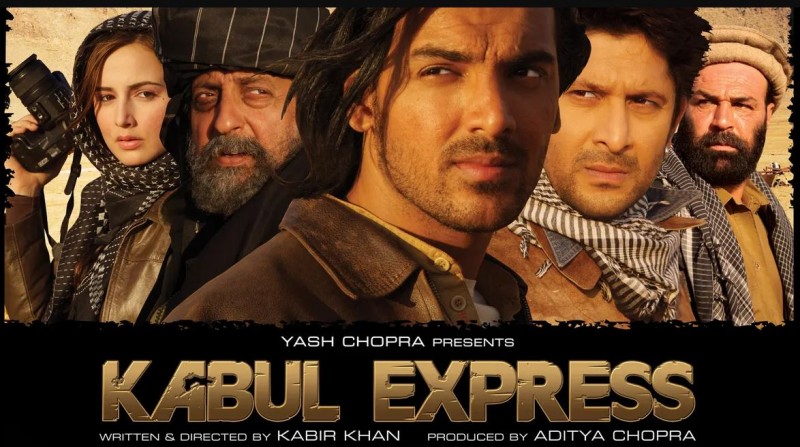
Making a movie has always been a difficult process with many challenges to get past in order to tell a compelling story. The process of creating "Kabul Express" is a remarkable illustration of the extent people will go to in order to share a tale, even in the face of overwhelming obstacles. This dark comedy-drama, which was directed by Kabir Khan and released in 2006, is a monument to the strength of art and the tenacity of those who produce it. It illuminates the unwavering spirit of a film crew who braved death threats from the Taliban in order to capture an engrossing story.
The narrative of "Kabul Express" centres on two Indian journalists named Suhel and Jai who travel to Afghanistan to report on the overthrow of the Taliban government and record the country's democratic transition. Although the film's story revolves around a treacherous journey, there were risks involved in the actual production, chief among them being threats from the Taliban. The Taliban, who are infamous for their violent acts and extreme ideologies, were not amused by the prospect of a Bollywood movie being filmed on their territory. Their contempt for films, music, and any other kind of entertainment they considered to be outside of Islam drove them to take this action.
The actors and crew of "Kabul Express" received a barrage of death threats in response from the Taliban. These threats were an attempt to coerce the filmmakers into stopping their work and flying out of Afghanistan right away. Even the most courageous of people would have been deterred by such a situation. Nevertheless, the film's production team did not back down in the face of intimidation.
The Afghan government acted quickly to safeguard the crew and cast's safety in the wake of these threats. The project's importance in depicting Afghanistan's transformation from a war-torn country to a hopeful, democratic society was acknowledged. To ensure the safety of the "Kabul Express" filming, the government, headed by President Hamid Karzai, imposed strict security.
Extensive and crucial security measures were implemented. On certain days, the number of armed soldiers on set would surpass the number of cast members and crew. The project's commitment from the government showed that it was determined to help the arts and add to the international narrative surrounding Afghanistan's recovery.
The actors and crew were escorted during their travels, armed guards were stationed at the film's shooting locations, and the security of their lodgings was guaranteed by the Afghan government. The filmmakers were able to concentrate on their work without being distracted by fear or anxiety thanks to these security measures.
In the face of the Taliban's threats, the "Kabul Express" cast and crew showed incredible bravery and tenacity. Notwithstanding the risks involved, the film's director Kabir Khan and leading actors John Abraham and Arshad Warsi were committed to seeing the project through to completion. Their devotion to the movie demonstrated not only their love for what they did, but also their faith in the ability of narrative to engender understanding across cultural divides.
The cast and crew's steadfast commitment to sharing the tale of Afghanistan's transformation is demonstrated by their ability to work under these trying circumstances. They were aware that "Kabul Express" could serve as a cultural bridge and inspire audiences all over the world with its message of resiliency and hope.
In addition to being a remarkable piece of filmmaking, "Kabul Express" made a big impact on how the post-Taliban era in Afghanistan was portrayed. It highlighted the nation's people's hopes and struggles while providing an insight into the intricate social and political landscape of the nation.
The legacy of the movie goes beyond its story. It represents the cooperative work of artists from various backgrounds coming together to create something potent that goes beyond intimidation and fear. "Kabul Express" serves as a timely reminder of the vital role that art plays in society as a tool for historical documentation, understanding-building, and change-inspiring.
Not just because of its compelling story and entertaining qualities, but also because of the unique production conditions, "Kabul Express" is a terrific cinematic achievement. The actors and crew continued to work on the movie despite the Taliban's threats, and it helped tell the story of Afghanistan's progress towards democracy and stability in its own unique way.
A major factor in this project's success was the Afghan government's dedication to guaranteeing the security of the movie's production. As an example of how perseverance, bravery, and resolve can triumph over hardship, the tale of "Kabul Express" is a monument to the power of art and storytelling.
"Kabul Express" is still a brilliant example of the unwavering spirit of people who dare to tell significant stories, despite the risks they face, in a world where artistic expression can occasionally be threatened. It is an ode to the timeless ability of film to portray the human condition and motivate constructive global change.
The 'Simba' Title Dispute and the Power of Disclaimers
Do Lafzon Ki Kahani' Pays Homage to Korean Classic
Aishwarya Rai and Randeep Hooda's 15-Minute 'Sarbjit' Commitment